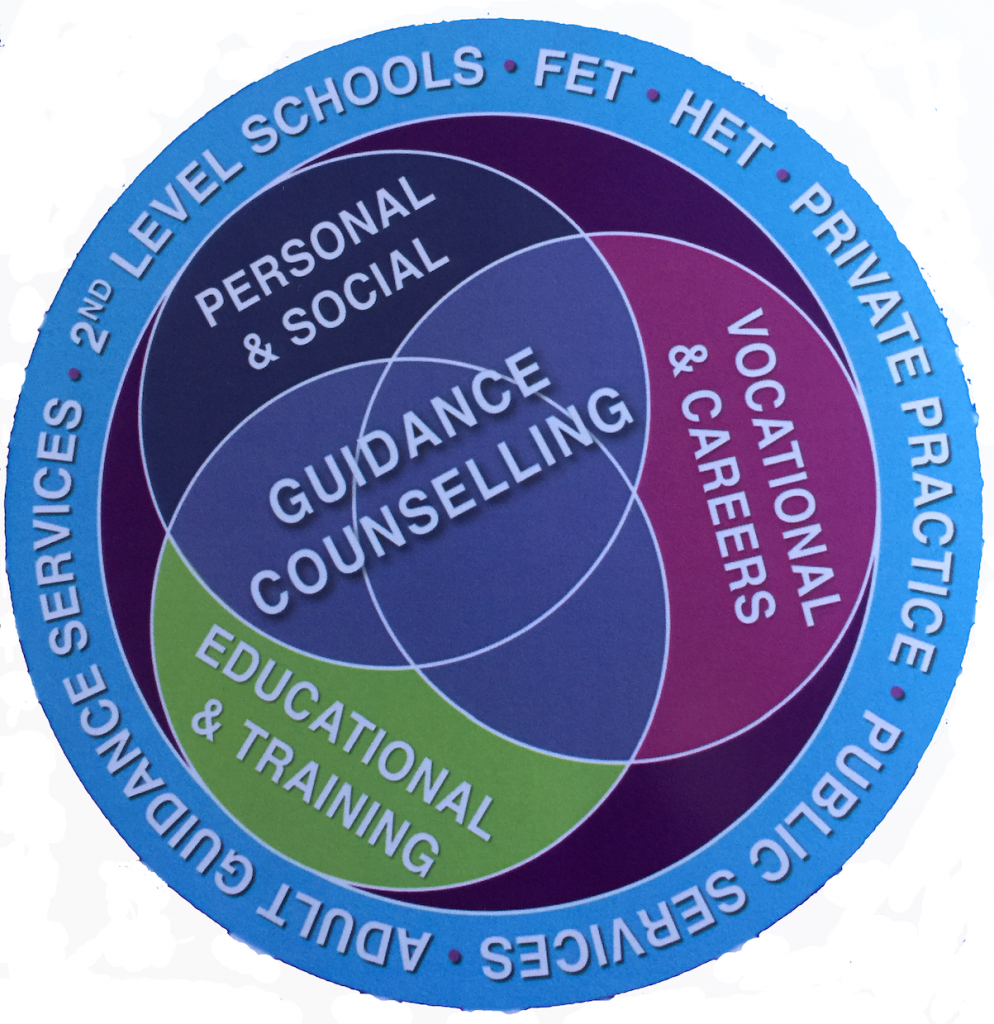Guidance Counsellors work with children in schools and with adults in a range of settings. Their work covers several important areas:

The guidance counsellor uses both guidance and counselling in personal, academic and vocational areas of their clients’ lives. They work in schools, with adults, in public and private service.
Guidance Counselling has the longest tradition of counselling in Ireland being the very first counselling to be introduced into this country and the Institute of Guidance Counsellors is the oldest counselling organisation in Ireland.
What the Guidance Counselling Service Offers
In the Vocational area guidance counsellor help their clients …
- get to know their own strengths
- clarify their areas of interest
- learn how to plan the next stage in their life
- learn how to cope with interviews and tests
- learn about CVs, letters and forms
- learn how to find and keep a job
- find and understand information about courses
In the Academic area a guidance counsellor offers help to …
- understand the advantages of school or training
- learn how to learn more effectively
- improve examination techniques
- get information about subject choices
- learn about exams and qualifications
In the Personal area a guidance counsellor helps clients by …
- giving them a chance to talk to someone in private
- doing everything possible to listen to them
- trying very hard to understand them
- not criticising them, punishing them or laughing at them
- not telling them what to do
- helping them clarify their own thoughts
- helping them to make their own decisions
The Guidance aspect of the guidance counsellor’s job is mainly one of dealing with groups, offering general information and guidelines.
The Counselling aspect of the guidance counsellor’s work offers each client the opportunity to talk in private about his or her queries and problems. This aspect of the role is supported by regular supervision sessions.
Guidance counselling is not psychotherapy, not psychology and not psychiatry nor it is a replacement for any of these. The work is best understood as front-line counselling where the guidance counsellor’s accessiblity to their clients in groups and individually is a major advantage.
Whole School Guidance
In their work in schools, guidance counsellors have pioneered and supported pastoral care systems, courses in personal well-being and psychometric assessments. They perform a very important coordinating and back-up role to the school’s well-being support services.
They liase within a school with the specialist staff in learning support, school completion, home and community liason persons.
In the broader community they link with employment agencies, social workers, psychologists (Health Board and NEPS) and the Gardaí.
Professionally guidance counsellors have the support of the Institute of Guidance Counsellors, a body that helps organise Continued Professional Development (CPD), annual conferences and general meetings and information bulletins. The IGC National Executive represents guidance counsellors in dealing with the Department of Education and Science and other bodies.
SPECIAL ADVANTAGES OF THE SCHOOL GUIDANCE COUNSELLOR
The school guidance counsellor in particular is very well situated to provide a special supportive service to the students, their parents and fellow staff members.
- NORMAL CURVE: They have experience of the full range of young people, the full normal curve and not simply the problem cases. Compared to external counsellors they have a better sense of what might not be “normal” when they meet young people.
- ENVIRONMENT: They work with young people in their everyday environment and for a big part of their day. They know how they behave with their peers and teachers, in groups and alone, in work and in play.
- ACCESS: They have easy access to peers, teachers, parents of young people, sources of extra information about the young people.
- LINKAGES: They network regularly with local health services, psychologists, gardaí, primary and other schools, Youthreach, FAS, youth support services, specialist counselling agencies.
- EDUCATION: They are part of young people’s education system with easy access to programmes such as SPHE, the Tutorial System where developmental and positive approaches to general personal well-being are possible.
- TRAINING: Their training extends beyond basic counselling skills, e.g., psychometrics, career work, academic support, personal well-being.
- AVAILABLE: Because of dealing also with career and academic areas young people feel free to visit the guidance counsellor without being labelled “problem” cases. Their office is right there in the school.
- LOCATION: They are very easily reached without complex bureaucratic hoops.
- CONFIDENTIALITY: A vital characteristic of their role offering young people adult support in very difficult situations.
- CONTINUITY: They do not normally change their positions or roles as often as other professionals and so have continuity of concern and experience. For young people this stability is essential.
- REPUTATION: From their general interactions within the school young people can get to know and trust them well before they need them.
- PROFESSIONAL: Guidance counsellors have professional supervision and regular in-service upskilling.
- ORGANISED: Theyhave a professional organisation complete with its Code of Ethics.
The Institute of Guidance Counsellors has been instrumental in introducing Reality Therapy into Ireland when, in 1985, the IGC invited Dr. William Glasser, creator of Reality Therapy, to give a talk in Drumcondra. This presentation was followed by the first Reality Therapy course in Ireland.
